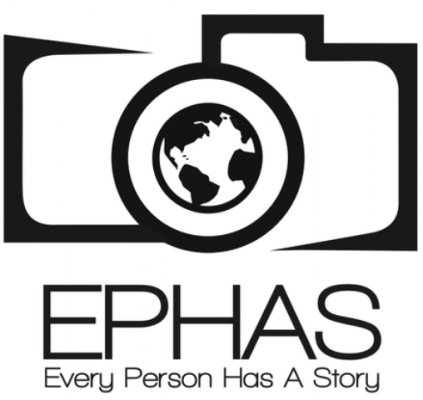The Power of Someone Else’s Story

By Ryan Ansin
Major media outlets are all too often the go-to source for news, creating what viewers and readers may assume is a universal opinion, which is absorbed and then expressed by the general public. But what if this wasn’t the case? What if, instead, news stories and images rose from the ground up and were designed to help deepen our knowledge of those who are different from ourselves?
High quality visual content created by people who might otherwise have little power and influence can in fact effect change. Access to authentic human stories offers audiences the chance to see the world from another viewpoint and enhances understanding across lines that might otherwise divide us.
The organisation I direct, Every Person Has a Story (EPHAS), is built on this theory. Our tool is the camera, and our vehicle is social and media outlets that are willing to utilise content from new, grassroots sources.
Our work with marginalised communities internationally focuses on using photography to help individuals capture basic ideas through photographs, which are then shared widely through media networks so that others can broaden their understanding of those who might seem to be “other”.
The work is guided by questions like: what does family look like in Uganda compared to Brazil? What is considered funny in Rwanda as opposed to Haiti? What does fear look like in Leer, South Sudan compared to Boston, Massachusetts – or innocence, pain, education or nutrition? Photography exercises are geared toward opening participants’ minds to tell the stories of their daily lives in a way that is comprehensive to an audience of all backgrounds, nationalities and ethnicities.
Such sharing is how individuals in different cultures can gain an understanding, even appreciation, for each other. For everybody’s sake, we must work to overcome the barriers that have remained for too long between those of different nationalities and backgrounds.
Through my work with EPHAS, I recently participated in the Nexus Global Youth Summit, convened by the international conflict transformation organisation Search for Common Ground, which connected two groups who rarely interact: philanthropists and social impact experts. These social impact experts focus on positive social change to improve standards of living and promote understanding around the world. Together, we spent four days searching for an answer to the question: How can we leverage our resources – financial, intellectual, and social – and connect a diverse group of people for the greater good?
Every Nexus participant has an idea or interest to do good, be it immediately or over the long-term. As philanthropists and entrepreneurs, we believe we must merge our efforts to maximise impact. By exposing and discussing victories and failures alike at events like Nexus, those who work to create social change will be able to replicate successes and learn from others’ mistakes – meaning that benefits to recipient communities will multiply.
Participants established relationships, brainstormed ideas and developed plans for collaboration. One major subject of discussion was the idea that in working to promote change in marginalised communities, authentic imagery and news stories from victims of social or environmental hardships as well as beneficiaries of social empowerment efforts is critical. In order to know how best to foster positive social change, hearing the stories of those involved is critical.
At Nexus, I met Aakif Ahmad, the Vice President and Co-Founder of Convergence: Center for Policy Resolution, which applies consensus-building techniques to resolving policy challenges. One of their latest projects focuses on US-Pakistan relations and bringing leaders from both groups together for discussions.
This work is hugely valuable, but the organisation knows that this understanding must radiate to the general public for real change. To supplement immediate-impact opportunities like Convergence’s US-Pakistani leaders forum, organisations like theirs must leverage the voices of those involved to reach more people on both sides. Thanks to Nexus, we are now beginning the conversation of how to best achieve this goal, leveraging EPHAS’s work using photography and media.
Both EPHAS and Nexus have demonstrated for me the power of bridging divides and initiating dialogue – whether between people in different fields or from different cultures. By bringing these stories to wide audiences, we can unlock dialogue and build bridges.
###
* Ryan Ansin is the Founder and Executive Director of Every Person Has a Story. This article was written for the Common Ground News Service (CGNews).

